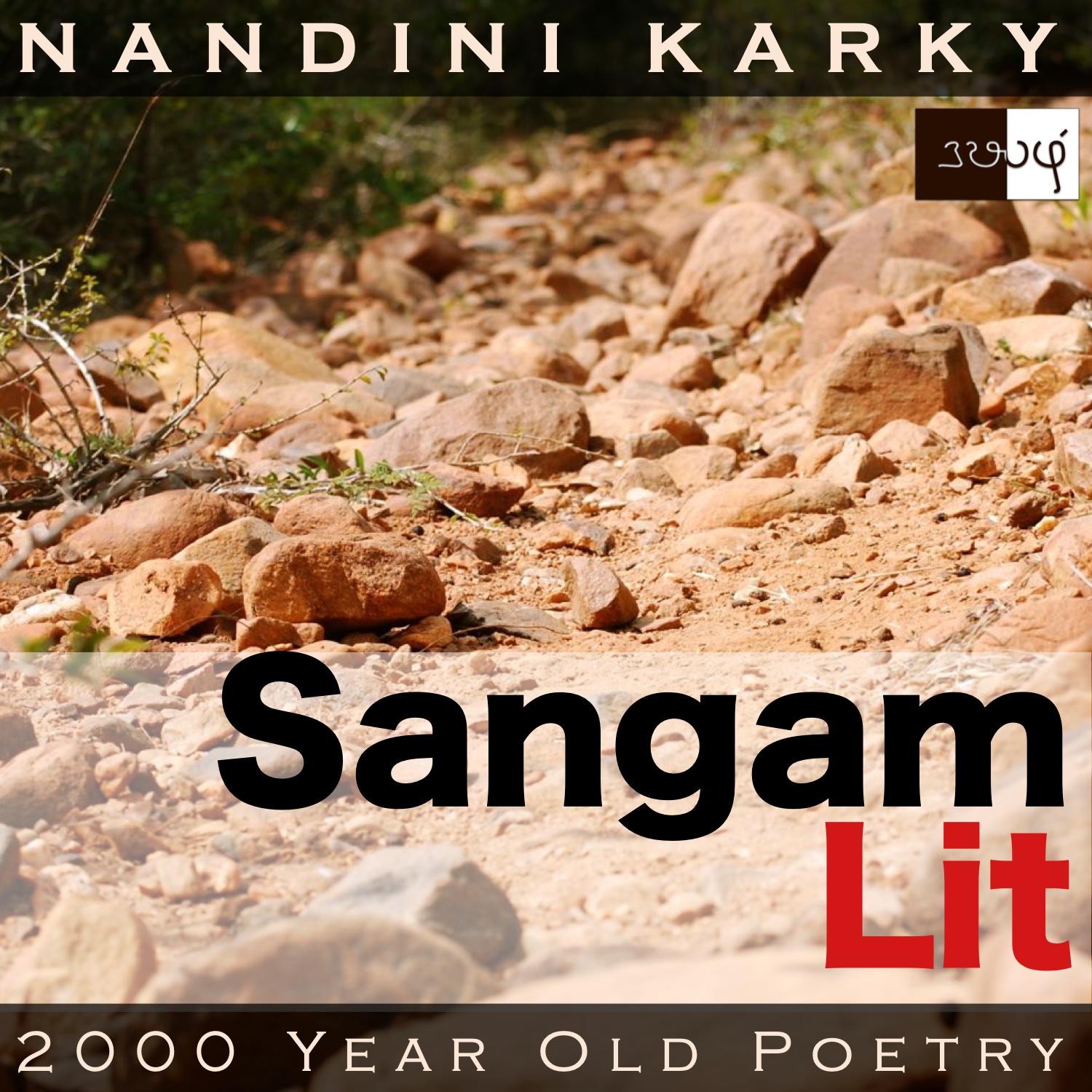Podcast: Play in new window | Download
Subscribe: Apple Podcasts | Spotify | Amazon Music | Android | iHeartRadio | TuneIn | RSS | More

In this episode, we perceive the hardships in travelling, as depicted in Sangam Literary work, Kurunthogai 56, penned by Siraikkudi Aanthaiyaar. Set in the drylands of ‘Paalai’, the verse speaks in the voice of the man to his heart, midway in his journey through the drylands.
வேட்டச் செந்நாய் கிளைத்தூண் மிச்சில்
குளவி மொய்த்த அழுகற் சில் நீர்
வளையுடைக் கையள், எம்மொடு உணீஇயர்,
வருகதில் அம்ம, தானே;
அளியளோ அளியள், என் நெஞ்சு அமர்ந்தோளே!
Decay and scarcity is at the core of this verse! The opening words ‘வேட்டச் செந்நாய்’ meaning ‘the hunting red dog’ makes us glimpse the oft-mentioned animal in the drylands, known by the name ‘dhole’ now. ‘கிளைத்தூண் மிச்சில்’ is an action-filled phrase that captures how ‘this red dog digs up the mud and laps up the water it finds, leaving behind a little, after its thirst has been satiated’. In exact words, the nature of this water is mentioned as ‘குளவி மொய்த்த அழுகற் சில் நீர்’ meaning ‘a small puddle of stagnant water, filled with decaying leaves and flowers of the wild jasmine’. We say hello to the female lead, who is addressed with the phrase ‘வளையுடைக் கையள்’ meaning ‘she who wears bangles’ and from this, we understand how women seemed to have been defined by the accessories they wore. Ending with the words ‘அளியளோ அளியள், என் நெஞ்சு அமர்ந்தோளே’ meaning ‘she is to be pitied dearly, the one who fills my heart’, the verse beckons us to listen to the story within.
Why is the bangle-wearing lady to be pitied? The context reveals that the man and lady had been leading a love relationship when the man had to part with the lady so as to gather wealth towards their wedding. At this time, the confidante, understanding the lady’s state of mind, insists that the man take the lady along. The man refuses this request and starts his travel. As he’s walking along in the drylands, he stops at a point and says to his heart, “What’s left of the hunting dog’s digging and drinking up is the decayed wild jasmine filled, stagnant water. If the lady, who wears fine bangles, were to drink from that, along with me, I would like that, indeed. But, if that were to happen, she’s to be pitied deeply, the one seated in my heart!” With these words, the man expresses how although he wished to be in the lady’s company, he thinks it wrong to put her through the distress of traversing the drylands.
Hunting dogs and jasmine ponds seem to be telling not a story of wildlife and scenic beauty but something else entirely! The man looks at a tiny puddle of water that is seen covered with fallen leaves and flowers of the wild jasmine tree and he reflects on the past of that pond. In his mind’s eye, he can see a red dog, arriving there, after hunting and feeding off carcass, thirsty after all that meat. With its paws, it digs up at the spot and manages to find some water there. Then, it laps up the water with its tongue and leaves only after it’s full. Imagine how little there must be, after the red dog has drunk from it! And, that’s all the water the man has, to drink, in his trip. This dirty water, with decaying plant bits! The man knows he has no choice but to drink that up. As he’s doing so, he thinks about the lady’s request to travel along with him. And, he says to himself, if that had happened, it would be something pleasant for him. To have a beloved by one’s side, is a dream for anyone, the man implies. However, he rises above his own desires and sees the state of the lady, drinking such filthy water along with him, and declares that if that were true, she, who rules over his heart, would be pitied dearly!
This is the man’s way of saying, ‘Good that I did not bring her along, for this is no place for my lady!’ We can sense the protectiveness in the man’s mind and his perception of the lady’s gentle nature. Women indeed seem to have been perceived as frail creatures, who could not bear the travails in ancient travel. What was once protectiveness becomes something patronising over time! But here, the purity of the man’s heart can be sensed in his words wishing that the lady were here but ending with the thought that it’s better for her that she’s not. The verse seems to throw light on that surprising sign of true love that does not do what the beloved wants but does what the beloved needs!




Share your thoughts...